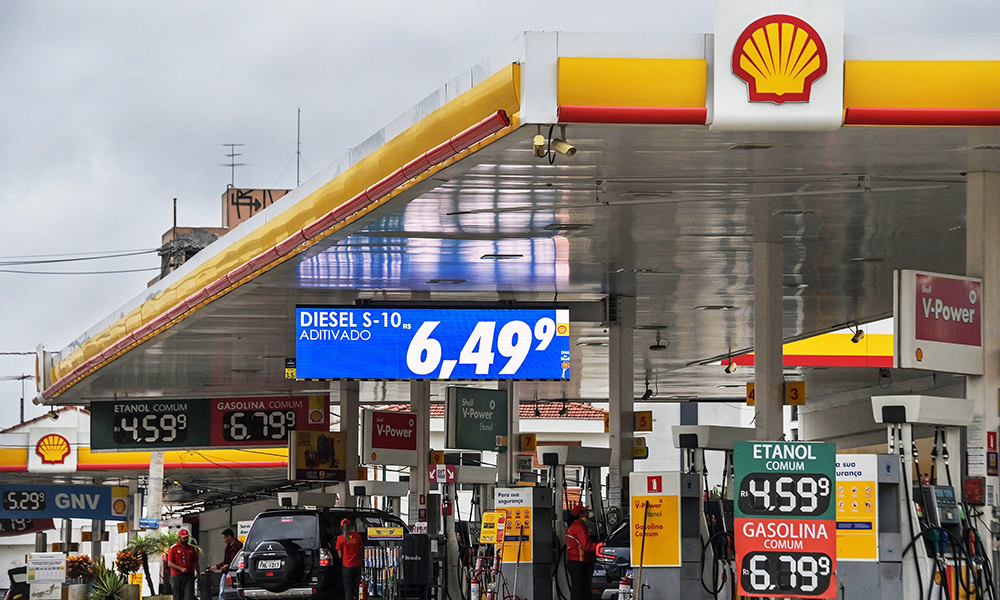
乍一看,這像是20世紀(jì)70年代才會(huì)出現(xiàn)的情景,。
但能源危機(jī)卻讓這一切成為當(dāng)下發(fā)生的現(xiàn)實(shí)狀況,。
年邁的老人們興許還記得自己年輕時(shí)經(jīng)歷的那“自我的十年”,記得喇叭褲,、迪斯科……還有石油危機(jī)帶來的文化沖擊,。那場(chǎng)危機(jī)讓高油耗汽車在一夜之間被淘汰,為多年經(jīng)濟(jì)不景氣而帶來的痛苦埋下伏筆,。
為應(yīng)對(duì)俄烏沖突導(dǎo)致的石油價(jià)格飆升,,3月18日,世界主要的能源監(jiān)督機(jī)構(gòu)提出了一項(xiàng)徹底的返古策略:建議推行城市周日無車日活動(dòng),并降低車輛在高速公路的最高時(shí)速,。這一策略是一系列建議推行的緊急措施的一部分,,旨在限制全球石油需求。
在俄烏沖突持續(xù)破壞全球石油供應(yīng)之際,,國(guó)際能源署(International Energy Agency)提出十項(xiàng)減少燃油需求的計(jì)劃,。根據(jù)該機(jī)構(gòu)的說法,如果計(jì)劃全面付諸實(shí)施,,這些措施就將在四個(gè)月內(nèi)讓石油需求每天減少270萬桶,。
國(guó)際能源署在3月18日的新聞稿中表示:“當(dāng)俄羅斯的大量石油供應(yīng)不再進(jìn)入市場(chǎng),且即將進(jìn)入7月和8月的石油需求高峰期之時(shí),,這些措施將大大減輕潛在壓力,。”
限制俄羅斯石油供應(yīng)
據(jù)國(guó)際能源署今年2月的報(bào)告顯示,,俄羅斯是全球最大的石油出口國(guó)和世界第三大產(chǎn)油國(guó),。自俄烏沖突爆發(fā)以來,西方國(guó)家對(duì)俄羅斯宣布了一系列嚴(yán)厲的經(jīng)濟(jì)制裁措施,,美國(guó)和英國(guó)宣布禁止進(jìn)口俄羅斯石油,,使得俄羅斯在經(jīng)濟(jì)上遭受重創(chuàng)。
據(jù)路透社(Reuters)報(bào)道,,隨著歐盟(European Union)討論對(duì)俄羅斯實(shí)施石油禁運(yùn),,供應(yīng)問題可能變得更加嚴(yán)重。根據(jù)國(guó)際能源署今年3月關(guān)于石油市場(chǎng)的報(bào)告所示,,由于經(jīng)濟(jì)制裁,,俄羅斯將損失石油總產(chǎn)量的大約三分之一。
本周晚些時(shí)候,,美國(guó)總統(tǒng)喬·拜登將在比利時(shí)布魯塞爾會(huì)見北約(NATO)的領(lǐng)導(dǎo)人,,討論如何加碼制裁俄羅斯,其中可能包括實(shí)施更多的禁運(yùn),。
倡導(dǎo)更多人居家辦公,?
國(guó)際能源署警告稱:全球各國(guó)可能很快就會(huì)面臨數(shù)十年來最大的石油供應(yīng)沖擊,強(qiáng)調(diào)各國(guó)應(yīng)該采取其十項(xiàng)計(jì)劃中列出的進(jìn)一步預(yù)防措施,。
3月18日,,國(guó)際能源署的署長(zhǎng)法提赫·比羅爾說:“國(guó)際能源署成員國(guó)已經(jīng)介入以支持全球經(jīng)濟(jì)發(fā)展。目前已經(jīng)初步釋放了數(shù)百萬桶緊急石油庫(kù)存,,此外我們也能夠根據(jù)需求采取進(jìn)一步行動(dòng),以避免出現(xiàn)嚴(yán)重的石油危機(jī),?!?/p>
比羅爾補(bǔ)充道:“這些措施已經(jīng)在多個(gè)國(guó)家試點(diǎn),并證明了其有效性。我們提出的十項(xiàng)計(jì)劃可以避免出現(xiàn)嚴(yán)重的石油危機(jī),?!?/p>
在這些措施中,國(guó)際能源署還建議各國(guó)能夠?qū)⒕蛹肄k公時(shí)間延長(zhǎng)至每周三天,,鼓勵(lì)乘坐實(shí)惠便利的公共交通工具,,此外,盡可能避免商務(wù)航空旅行,,采取其他旅行方式,。
國(guó)際能源署表示:“減少石油需求并不能完全依靠各國(guó)當(dāng)局推行措施下達(dá)命令,其中有幾項(xiàng)可以由地方政府,,例如州,、地區(qū)或鄉(xiāng)鎮(zhèn)政府直接實(shí)施,或者由公民和企業(yè)自愿遵循,,這樣一來,,公民也能省錢?!保ㄘ?cái)富中文網(wǎng))
譯者:ZHY
乍一看,,這像是20世紀(jì)70年代才會(huì)出現(xiàn)的情景。
但能源危機(jī)卻讓這一切成為當(dāng)下發(fā)生的現(xiàn)實(shí)狀況,。
年邁的老人們興許還記得自己年輕時(shí)經(jīng)歷的那“自我的十年”,,記得喇叭褲、迪斯科……還有石油危機(jī)帶來的文化沖擊,。那場(chǎng)危機(jī)讓高油耗汽車在一夜之間被淘汰,,為多年經(jīng)濟(jì)不景氣而帶來的痛苦埋下伏筆。
為應(yīng)對(duì)俄烏沖突導(dǎo)致的石油價(jià)格飆升,,3月18日,,世界主要的能源監(jiān)督機(jī)構(gòu)提出了一項(xiàng)徹底的返古策略:建議推行城市周日無車日活動(dòng),并降低車輛在高速公路的最高時(shí)速,。這一策略是一系列建議推行的緊急措施的一部分,,旨在限制全球石油需求。
在俄烏沖突持續(xù)破壞全球石油供應(yīng)之際,,國(guó)際能源署(International Energy Agency)提出十項(xiàng)減少燃油需求的計(jì)劃,。根據(jù)該機(jī)構(gòu)的說法,如果計(jì)劃全面付諸實(shí)施,,這些措施就將在四個(gè)月內(nèi)讓石油需求每天減少270萬桶,。
國(guó)際能源署在3月18日的新聞稿中表示:“當(dāng)俄羅斯的大量石油供應(yīng)不再進(jìn)入市場(chǎng),且即將進(jìn)入7月和8月的石油需求高峰期之時(shí),,這些措施將大大減輕潛在壓力,?!?/p>
限制俄羅斯石油供應(yīng)
據(jù)國(guó)際能源署今年2月的報(bào)告顯示,俄羅斯是全球最大的石油出口國(guó)和世界第三大產(chǎn)油國(guó),。自俄烏沖突爆發(fā)以來,,西方國(guó)家對(duì)俄羅斯宣布了一系列嚴(yán)厲的經(jīng)濟(jì)制裁措施,美國(guó)和英國(guó)宣布禁止進(jìn)口俄羅斯石油,,使得俄羅斯在經(jīng)濟(jì)上遭受重創(chuàng),。
據(jù)路透社(Reuters)報(bào)道,隨著歐盟(European Union)討論對(duì)俄羅斯實(shí)施石油禁運(yùn),,供應(yīng)問題可能變得更加嚴(yán)重,。根據(jù)國(guó)際能源署今年3月關(guān)于石油市場(chǎng)的報(bào)告所示,由于經(jīng)濟(jì)制裁,,俄羅斯將損失石油總產(chǎn)量的大約三分之一,。
本周晚些時(shí)候,美國(guó)總統(tǒng)喬·拜登將在比利時(shí)布魯塞爾會(huì)見北約(NATO)的領(lǐng)導(dǎo)人,,討論如何加碼制裁俄羅斯,,其中可能包括實(shí)施更多的禁運(yùn)。
倡導(dǎo)更多人居家辦公,?
國(guó)際能源署警告稱:全球各國(guó)可能很快就會(huì)面臨數(shù)十年來最大的石油供應(yīng)沖擊,,強(qiáng)調(diào)各國(guó)應(yīng)該采取其十項(xiàng)計(jì)劃中列出的進(jìn)一步預(yù)防措施。
3月18日,,國(guó)際能源署的署長(zhǎng)法提赫·比羅爾說:“國(guó)際能源署成員國(guó)已經(jīng)介入以支持全球經(jīng)濟(jì)發(fā)展,。目前已經(jīng)初步釋放了數(shù)百萬桶緊急石油庫(kù)存,此外我們也能夠根據(jù)需求采取進(jìn)一步行動(dòng),,以避免出現(xiàn)嚴(yán)重的石油危機(jī),。”
比羅爾補(bǔ)充道:“這些措施已經(jīng)在多個(gè)國(guó)家試點(diǎn),,并證明了其有效性,。我們提出的十項(xiàng)計(jì)劃可以避免出現(xiàn)嚴(yán)重的石油危機(jī)?!?/p>
在這些措施中,,國(guó)際能源署還建議各國(guó)能夠?qū)⒕蛹肄k公時(shí)間延長(zhǎng)至每周三天,鼓勵(lì)乘坐實(shí)惠便利的公共交通工具,,此外,,盡可能避免商務(wù)航空旅行,采取其他旅行方式,。
國(guó)際能源署表示:“減少石油需求并不能完全依靠各國(guó)當(dāng)局推行措施下達(dá)命令,,其中有幾項(xiàng)可以由地方政府,例如州,、地區(qū)或鄉(xiāng)鎮(zhèn)政府直接實(shí)施,,或者由公民和企業(yè)自愿遵循,,這樣一來,公民也能省錢,。”(財(cái)富中文網(wǎng))
譯者:ZHY
It’s looking a lot like the 1970s suddenly.
Energy crises have a way of doing that.
Those old enough to remember living through the “Me decade” remember the bell bottoms, the disco … and the culture shock of an oil crisis that made gas-guzzling cars obsolete overnight and set the stage for years of economic pain.
On March 18, the world’s leading energy watchdog suggested a downright retro strategy to cope with the skyrocketing price of oil amid war in Ukraine: car-free Sundays in cities and reduced speed limits on highways as part of a series of recommended emergency measures aimed at limiting global oil demand.
The International Energy Agency’s 10-point plan to cut oil use comes as the Russian invasion of Ukraine continues to rupture global oil supplies. According to the IEA, the plan would lower oil demand by 2.7 million barrels a day within four months if fully carried out.
“This would significantly reduce potential strains at a time when a large amount of Russian supplies may no longer reach the market and the peak demand season of July and August is approaching,” the organization wrote in March 18’s press release.
Moving away from Russian oil
Russia—the world’s largest exporter of oil to global markets and the third-largest oil-producing country in the world, according to the IEA’s Feb. report—has suffered economically since its unprovoked invasion of Ukraine prompted the Western world to dole out a string of harsh economic sanctions and outright bans on Russian oil from the U.S. and U.K.
The supply issue could continue to tighten as the European Union debates instituting its own embargo of Russian oil, according to Reuters. According to the IEA’s March report on the oil markets, Russia stands to lose roughly one-third of its total oil production due to economic sanctions.
Later this week, President Joe Biden will meet with NATO leaders in Brussels to discuss implementing further consequences for Russia’s invasion, which could include more embargoes.
More working from home?
As a result, the IEA is warning that the world may soon be facing its biggest oil supply shock in decades and stressed the importance of countries taking further preventative measures laid out in its 10-point plan.
“IEA Member Countries have already stepped in to support the global economy with an initial release of millions of barrels of emergency oil stocks, but we can also take action on demand to avoid the risk of a crippling oil crunch,” said IEA Executive Director Fatih Birol on March 18.
“Our 10-Point Plan shows this can be done through measures that have already been tested and proven in multiple countries,” Birol added.
Other recommendations in the IEA’s plan include working from home for up to three days a week, cheaper public transportation and avoiding business air travel if alternative options exist.
“Reducing oil demand does not depend solely on national governments,” the IEA said. “Several of the measures can be implemented directly by other layers of government – such as state, regional or local – or just voluntarily followed by citizens and corporates, enabling them to save money while showing solidarity with the people of Ukraine.”






